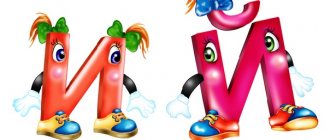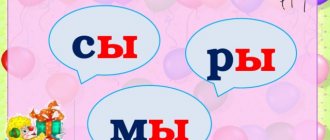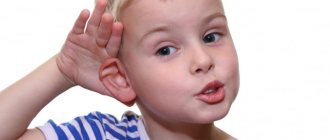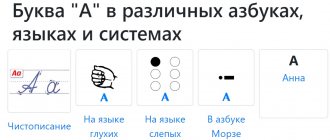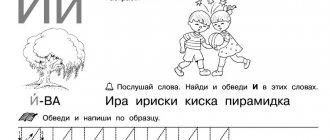Continue the sentence
He slept all winter in a fur coat, sucked his brown paw, and when he woke up, he began to roar. This is a forest animal... (bear).
Look at the fellows: Cheerful and lively. Dragging from all ends Material for construction. One suddenly stumbled and a friend rushes to the rescue. The people here are good. Without work, for the life of me. Can’t live... (ant).
Lyudmila went to wash her hands. She needed... (soap).
Everyone here in the forest is talented - both a singer and... (musician).
Our Tanya is crying loudly. Dropped it into the river... (ball).
The distance of the fields turns green, the nightingale sings. The garden is dressed in white, The bees are the first to fly. Thunder rumbles. Guess what month this is? … (May.)
We put the puppy in water and soap for two hours with a washcloth... (washed).
Under a heavy burden - Underground, in a closet. She lives in a hole. Gray baby. Who is this? ... (mouse.)
In a black field, a white hare jumped, ran, and made loops. The trail behind him was also white. Who is this hare? … (chalk.)
Assignment: Printed letter M for preschoolers
- Look at the letter M. What does it look like?
- Form the letter M with your fingers.
- Write the letter M in the air.
Draw the sticks carefully along the cells with a simple pencil or ballpoint pen.
In cases where the child is asked to write a whole line of a letter, syllable or word, the adult gives a writing sample at the beginning of the line. If a preschooler has difficulties, then an adult can draw two approximate lines, or put reference points that the child will connect with lines, or write the entire letters, and the child will simply circle them in a different color. Calligraphy should not be required at this stage of training.
Print
Riddles for children starting with the letter M
The giant stands in the port, illuminating the darkness, and signals to the ships: “Come and visit us!” (Lighthouse)
Above the river, across. The giant lay down stretched out. Across the river, along the back. He allowed me to walk. (Bridge)
The owner of the forest wakes up in the spring, And in winter, to the howl of a blizzard, He sleeps in a snowy hut. (Bear)
In the forest near the stump there is running and bustling: The working people are busy all day, building a house for themselves. (Ants)
The red nose has grown into the ground, and the green tail is outside. We don't need a green tail, we only need a red nose. (Carrot)
He flies all day long, bores everyone; The night will come. Then it will stop. (Fly)
Crowded, noisy, young, the city rumbles underground. And there are houses with people running along the street. (Metro)
It slips away like something alive, But I won’t let it go. It foams with white foam, I’m not too lazy to wash my hands. (Soap)
What kind of artist applied leaves, grass, and thickets of roses to the glass? (Freezing)
Small stature, long tail, gray coat, sharp teeth. (Mouse)
A red-hot arrow felled an oak tree near the village. (Lightning)
Liquid, not water. White, not snow. (Milk)
The white pebble melted and left marks on the board. (Chalk)
Horned, but not butting. (Month)
Tale about the letter M
The mouse Mouse and the bear cub Misha were lying in the clearing and eating raspberries. The mouse says: “Let’s come up with poems.” Listen to what I wrote:
Every day and every hour we stubbornly repeat: There is no one in the world better than ours...
- Raspberries! - Misha yelled. - What does “raspberry” have to do with it! I wanted to say: “Better than our mother.” - That's great too! And now I’ll write... What about? - Well, at least about this fly agaric.
Don't eat white pasta, but eat red fly agarics!
- What are you, what are you! - The mouse was scared. “You can’t eat fly agarics, you’ll end up in the hospital.” Here, listen to the verse about the doctor:
There is no more important doctor in the forest than the lively redhead...
- Aibolit! - the bear cub yelled. - Yes, not Aibolit, but an ant. Aibolit heals animals, and the ant heals the forest. - How do you know so much? - He who reads a lot knows a lot! - the mouse Mouse answered importantly...
(G. Yudin)
Sounds [M]-[Мь], letter M - summary of frontal lesson
Development of phonemic hearing.
Frontal lesson. Senior group ONR-III
First year of study (I period)
Topic: Sounds “M” - “M”. Letter M. Second lesson.
- Further differentiation of the concepts “sound-word”, “sound-letter”
- Clarification of auditory perception.
- Formation of phonemic representations.
- Development of phonemic analysis.
- Development of auditory-verbal memory.
- Object pictures, signals (symbols), ball, magnetic letters, chips
Lesson plan.
1. Organizational moment.
2. Game “Count the vowel sounds.”
- Raise as many fingers as you can hear vowel sounds (AU O AUI).
- What sounds were counted? (vowels)
Clarification of articulation of vowel sounds.
3. - What consonant sounds do we learn to distinguish?
Comparative characteristics of M - Mb according to articulatory-acoustic properties.
- What kind of “houses” do they live in?
- What letter do we denote? Clarifying the image of the letter M
4. Game “Whose ears hear better?”
ball, poppy, mouse, bear, washes, cute, home, brave, wet, funny.
- What will I do? (say words)
- And you? (raise the desired signal)
- What signal will you raise when you hear the sound M? (blue)
- Sound M? (green)
Children raise the necessary signals.
5. Ball game “Remember and repeat.”
Speaking “chains” of words. Three words each with the sounds M Мь.
- What sounds or words did you say? (words)
6. Game “Who can remember the most words?”
Colored chips (stripes) are distributed.
- What did you remember? Words)
7. Game “Don’t yawn, choose the right picture.”
The pictures are laid out on the carpet. Boys choose the sound M, girls choose the sound Mb. One by one they are carried to their places. The game begins and ends at the speech therapist's signal. Examination.
8. Game "Wizards".
Analysis of syllables AM MA MI.
- How many sounds do you hear?
We work on a marker board. First, we designate the sound with the desired signal. We draw with colored markers, then substitute magnetic letters.
9. Reading syllables.
AM MA OM MO UM MU IM MI EM ME WE
When reading the second column, instructions are given:
— The letters are “friends.” First, look at the second one, it will tell you which vowel sound you should open your mouth to next, and how to read: softly or firmly. The letter I suggests that the letter M in front of it represents a soft sound. Here these “clothes” (M) were put on by the soft “brother” Mb.
Group speech therapy lesson on the topic “Sounds [m], [m']. Letter M"
Sections: Speech therapy
Purpose of the lesson: to introduce the sounds [M], [M'] and the letter M.
Tasks: differentiation of sounds [M], [M'] by ear, familiarization with the image of the letter M; improving phonemic awareness, sound analysis and synthesis skills; development of fine motor skills, auditory attention, memory, prosodic aspects of speech; nurturing love and respect for your family.
Material: pictures: house, family, crown, cloud, bridge, snowball, sleigh, donkey, hammer, catfish, door, cucumber, car, carrot, stork, crane, poppy; sound houses, sound symbols, graphic representation of the letter “M”, individual mirrors, notebooks, counting sticks.
Progress of the lesson
Organizing time.
Psycho-gymnastics. Mimic exercises.
– What kind of facial expressions do mom and dad have when they are happy, sad, angry. Portray a joyful mom and an angry dad. Take a mirror, it will help you.
Breathing exercises. “Cooking porridge”
Our mother cooks porridge and feeds her daughter Masha with porridge.
I.p. – standing, one palm on the chest, the second on the stomach. Inhale through your nose, as you exhale say “puff-puff-puff” and stroke your stomach.
Report the topic of the lesson.
- Guys, guess the riddle:
Where is our family comfortable? Where does it smell like porridge in the morning? Cats' paws step there, And there are slippers at the entrance. (House)
The picture “House” is displayed.
– What is the last sound you hear in the word “house”? [M]. A family lives in this house. Listen to what consonant sound is in the middle of the word family [M']. ( The picture “family” is displayed)
– Today we will get acquainted with the sounds [M] and [M'], as well as with the letter “M”, which denotes these sounds.
Characteristics of the sounds [M], [M'] according to articulatory and acoustic characteristics.
– Take the mirrors, pronounce the sounds [M], [M'] alternately. What's happening to your lips? ( The lips close.
When we pronounce the sound [M], our lips become a little angry, and when we pronounce the sound
[M']
, they smile a little).
Does the air come out through the nose or through the mouth?
( Through the nose
).
Is the voice “sleeping” or “waking up”? ( Wakes up)
.
So what are the sounds [M], [M']? ( Consonants, voiced
).
The sound [M] is ( hard
), and [M'] is
(soft).
We denote the sound [M] with a (
blue
) square, [M'] – (
green).
Development of phonemic perception differentiation of sounds [M], [M'].
Game “Listen carefully”
– Now I’ll see how attentive you are. I will name the words, and if you hear the sound [M], raise the blue square, if [M'] is green.
Words: m
milk,
bear
,
bridge
,
hammer
,
compote
,
month
,
mouse ,
family
.
Analysis and synthesis of syllables with sounds [M], [M']
Game “Count the sounds”
– Listen, and count how many sounds I make, and use the symbol chips to make diagrams. Be careful: MA, AM, YM, WE, etc. (Children count and lay out patterns of syllables)
Game “Let's be friends.”
– You and I are already familiar with several vowel sounds. Name them ( a, o, y, s, and)
. Let's “make friends” with the sounds [M], [M']. I will name the vowel, and you add the sound [M], so that it comes first, and name the resulting syllable. A – MA, O – MO, U – MU, Y – WE. Well done! Now add the sound [M'], so that it is the second, and name the resulting syllable.
Determining the position of the sounds [M], [M'] in words.
– Let's come up with names with the sounds [M], [M'] for all family members ( Dima, Mitya, Maya, Masha, Mila, etc.
.) Determine where the sounds [M], [M'] are located in these words: at the beginning, in the middle or at the end of the word.
Working with sound houses
- How children can affectionately call their mother ( children's answers
).
What do you affectionately call your mother? ( Mommy, mummy, mummy, etc.
).
What did you notice when you said these words? (These owls have two sounds [M])
What is she like, your mother?
( kind, affectionate, sweet, etc.).
Physical exercise.
Now let's “charge up”
We stamp our feet: - Top - top - top. We raise our hands: - Clap - clap - clap. We will spread our hands and run in circles.
Development of phonemic representations.
Game “Guess the word”.
Progress of the game: The speech therapist offers the children cards with images of objects, the children must highlight the first sound of each word, and, alternately adding them, form a new word. First an example is given.
Cards: crown, cloud, bridge – com
sleigh, donkey, hammer -
catfish
door, cucumber, car -
house
, carrot, stork, crane -
poppy
Development of prosody.
– Mom bathed baby Mila and said the following words:
Mom washed Mila with soap
Mila didn't like soap.
(The clear speech is read on behalf of all family members in turn, with a change in timbre and strength of voice)
.
Introducing the letter “M”.
- Children, do you love your mothers? (Yes). To write this beautiful word, you need to get acquainted with the letter “M”. Look what the letter “M” looks like. (Children's answer options). Let's try to draw the letter “M” together.
Friends held hands. And they said: “You and I are us!” Meanwhile, the letter “M” turned out.
(Children join hands in pairs, depicting the letter “M”).
- Well done! You can also make the letter “M” from counting sticks.
Laying out the letter “M” from counting sticks.
Progress of the game: Children closed their eyes. The speech therapist removes one counting stick. Children must restore the letter “M”.
While your eyes were fast asleep, The letters in the book became smaller, Open your eyes What to add, guess! (Words by author)
Finger gymnastics “My family”
Clench your fingers into a fist. Then straighten them one by one, starting with the thumb.
This finger is grandpa, This finger is grandma, This finger is daddy, This finger is mommy, But this finger is me. That’s my whole family.
(To the words of the last line, rhythmically clench and unclench your fingers.)
Coloring letters in notebooks.
Summary of the lesson.
– What sounds did we get acquainted with? What letter are they denoted by?
Surprise moment. Game “Magic Box”.
– Children, today you called so many good, kind, affectionate words with the sounds [M], [M']. Let's remember them again and say them into our palms, and put them in a magic box. ( The speech therapist takes out multi-colored stars from the box
). Now guys, look, your words have turned into stars, this is gratitude for the good work in class.
- Pozhilenko E.A. The magical world of sounds and words A manual for speech therapists. – M.: Humanite. ed. VLADOS center, 2002
- Kartushina M.Yu. Logorhythmic activities in kindergarten. Method. manual - M.: Sphere shopping center, 2004.
- Novikova E.V. Articulation of sounds in a graphic image. Educational and demonstration material. – M.: Publishing house GNOM and D, 2003.
Articulation and pronunciation of M
If we pronounce a word that contains such a sound, for example: ball, Masha, we will feel that the lips are slightly compressed, the tongue inside the oral cavity is moved back a little and even slightly pulled up to the upper palate with its middle part.
Then we feel the air begin to come out through the nose. A voice is heard, i.e. the sound is loud.
He doesn't have a partner, i.e. there is no sound similar to [m], but dull.
It can be pronounced firmly or softly. It depends on the letters next to the M.
Carrot - ball (hard - soft).
Remember: The letter M stands for the consonant sound [m]. It can be hard or soft, but it is always a labial nasal sonorant sound. The sound is softened by vowels - e, e, i, i and a soft sign: mint, chalk, bear, eight and others.
